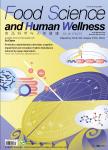Dioscin from Polygonatum sibiricum induces apoptosis and autophagy in Ishikawa human endometrial cancer cell and in vivo
作者机构:School of Biological Science and Engineering Collaborative Innovation Center for Food Production and Safety North Minzu University School of Food and Biological Engineering Hefei University of Technology
出 版 物:《Food Science and Human Wellness》 (食品科学与人类健康(英文))
年 卷 期:2023年
核心收录:
学科分类:1006[医学-中西医结合] 10[医学] 100602[医学-中西医结合临床]
基 金:supported by the National Key Research & Development Program of China (2022YFF1100305) the National Natural Science Foundation of Ningxia (2021AAC02019) the Youth talent cultivation project of North Minzu University (2021KYQD27 FWNX14) Key research and development projects in Ningxia (2021BEF02013)
摘 要:With an aim to comprehend the precise regulatory mechanism of dioscin against endometrial carcinoma (EC), we firstly extracted the components from Polygonatum sibiricum followed by identification and structural characterization. The anti-EC activity of dioscin was initially determined based on the inhibition of Ishikawa cell proliferation and tumor growth. The high-throughput sequencing data indicated that dioscin not only promoted apoptosis, including decrease of PARP and Bcl-2 and increase of c-PARP and Bad, but also induced autophagy, including increase of autophagic lysosomes and LC3II/LC3Ⅰ ratio. Mechanistic exploration suggested that dioscin induced autophagy and apoptosis through inhibition of PI3K/AKT/mTOR signaling pathway. Besides, the dioscin-regulated p53 pathway was mainly involved in autophagy induction. Furthermore, inhibition of Ishikawa cell autophagy was linked to dioscin-induced apoptosis. Our data suggest the immense potential of dioscin for the development of functional food for EC and related medical application.



